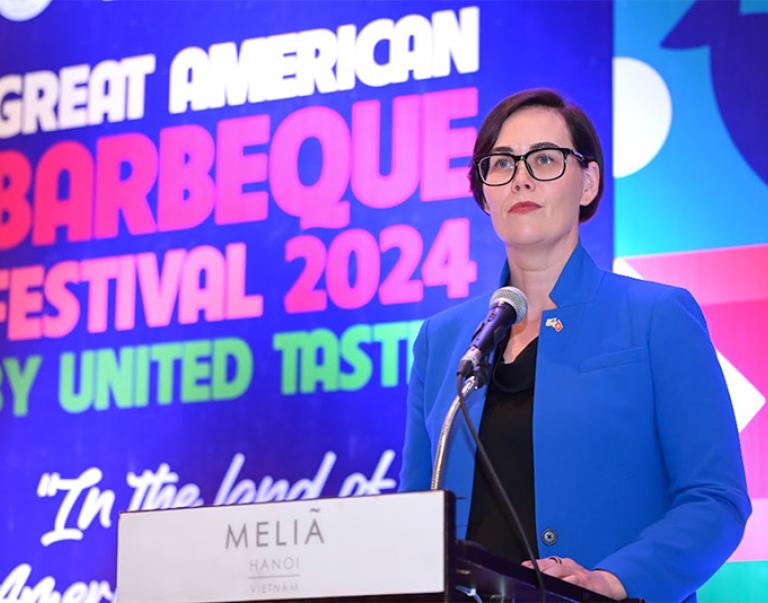WASHINGTON, June 30, 2015 — Today, the Obama Administration invited communities to participate in Local Foods, Local Places, a federal initiative providing direct technical support to build strong local food systems as part of a community's emerging economic action plans. Under this effort, a team of agricultural, transportation, public health, environmental, and regional economic experts will work directly with local communities to spur local economic growth and improve the quality of life for all residents.
Local food sales topped $11.7 billion in 2014 according to industry estimates, underscoring the economic benefit that a local food system can offer a community. As part of today's announcement, the U.S. Department of Agriculture (USDA) released an updated state-by-state "Made in Rural America" report illustrating the impact of USDA's investments in rural communities, including local food. USDA has invested more than $800 million in more than 29,100 local and regional food businesses and infrastructure projects over the past six years.
"These state by state analyses reaffirm that local food is rapidly growing from a niche market to an integrated system recognized for its economic boost to communities across the country," said Secretary Vilsack. "Local food creates new market opportunities for farmers, brings fresh meals into schools and other institutions, expands healthy food access to underserved communities, and builds infrastructure needed to support ranchers and other meat processors. By investing in projects at the local level, this Administration is encouraging growth in this sector and creating new opportunities for families who live in rural America."
This is the second year of the Local Foods, Local Places program. In 2014, 26 rural and urban communities participated in the program to create year-round, downtown markets featuring foods from local farmers; establish retail outlets to help revitalize small-town main streets; build centrally located community kitchens or food hubs to aggregate and market local foods; support business incubators to help entrepreneurs start food-related businesses on main streets; enhance public spaces for people to walk or bicycle to farmers markets and local restaurants; assist schoolchildren to grow their own food and make healthy local food accessible to families, including via SNAP benefits; and develop community gardens in walkable, transit-accessible places.
Technical support teams through Local Foods, Local Places helped Osceola, Arkansas (pop 7,700) develop a new health foods cooking curriculum for the local school district, create a plan for a new downtown farmers market and implement infrastructure improvement efforts; guided North Little Rock, Arkansas (population 62,000) to enhance the livability of an emerging neighborhood though a new food hub; and worked with Wheeling, West Virginia (pop 28,000) to revitalize underused property into a community orchard, multi-use food facility, and a mobile market.
Local Foods, Local Places is a partnership between USDA, the U.S. Centers for Disease Control and Prevention (CDC), the Environmental Protection Agency (EPA), the Department of Transportation (DoT), the Appalachian Regional Commission (ARC), and the Delta Regional Authority (DRA). The effort is part of the White House Rural Council's "Rural Impact" effort to improve quality of life and upward mobility for kids and families in rural and tribal communities. Together, the agencies are investing $800,000 to support this round of assistance. Application guidelines and deadlines are available on line.
Since 2009, USDA has invested in 29,100 food hubs, small scale processing, farmers market and other opportunities in local food across all 50 states and the US territories. This includes USDA investments in the local food sector through over 12,000 microloans, smaller loans of up to $50,000 for small-scale producers who often sell products locally; and over 13,000 high tunnels, low-cost covered structures that extend the growing season and make locally-grown products available later into the year.
Among the top ten states with federally funded local food projects are Kentucky, Wisconsin, Mississippi, Texas, Alabama, Missouri, Minnesota, West Virginia, Iowa, and Michigan. Five of these states (Kentucky, Mississippi, Alabama, Texas and West Virginia) are part USDA's StrikeForce Initiative for Rural Growth and Opportunity which coordinates USDA assistance in the Nation's most economically challenged rural areas.
Many of these projects can be found on the Know Your Farmer, Know Your Food Compass. Searchable by state, zip code, project type and funding program, the Know Your Farmer, Know Your Food Compass maps federal local food investments made by USDA and 10 other federal agencies between fiscal years 2009-2013. The Compass is part of the USDA's Know Your Farmer, Know Your Food Initiative. Secretary Vilsack has identified local and regional food systems as one of the four pillars of rural economic development, along with production agriculture, the bio-based economy, and natural resources and conservation.
The state by state fact sheets are available at www.usda.gov/opportunities. Each state factsheet highlights specific USDA investments in local food as well investments in rural businesses, manufacturing, energy, water and other infrastructure development. They also outline how USDA is helping rural communities attract businesses and families by investing in housing and broadband.
#
USDA is an equal opportunity provider and employer. To file a complaint of discrimination, write: USDA, Office of the Assistant Secretary for Civil Rights, Office of Adjudication, 1400 Independence Ave., SW, Washington, DC 20250-9410 or call (866) 632-9992 (Toll-free Customer Service), (800) 877-8339 (Local or Federal relay), (866) 377-8642 (Relay voice users).



